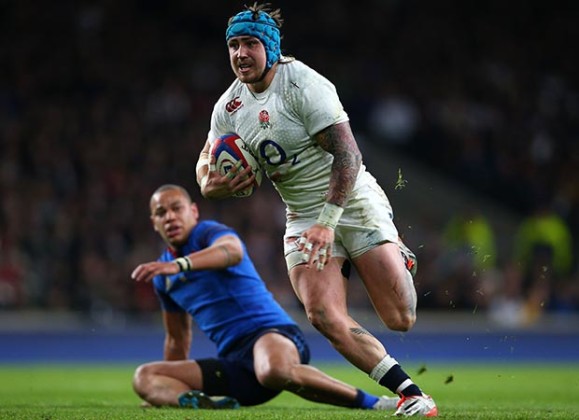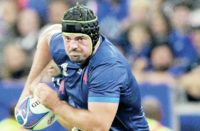 Chris Ashton has spent all season looking-in at the England squad from the outside, and the Saracens wing yearns to be back at the epicentre of Stuart Lancaster's plans. With the England head coach about to announce a World Cup training squad of 45 on May 20 that doesn't exactly make Ashton a rarity – but what does make him one-of-a-kind among the Premiership's elite finishers is an unrivalled strike rate of 19 tries in 39 international Tests.
Chris Ashton has spent all season looking-in at the England squad from the outside, and the Saracens wing yearns to be back at the epicentre of Stuart Lancaster's plans. With the England head coach about to announce a World Cup training squad of 45 on May 20 that doesn't exactly make Ashton a rarity – but what does make him one-of-a-kind among the Premiership's elite finishers is an unrivalled strike rate of 19 tries in 39 international Tests.
The last of those came in the summer tour of New Zealand a year ago, before Ashton was dropped by England ahead of the autumn series, and he remained surplus to requirements for the entire Six Nations. The Saracens striker has responded by raising his game for his club – as Lancaster and Co had told him he had to following a series of positional lapses in defence for his country.
Ashton has not only tightened the bolts on his defensive struts during an impressive season for Saracens, he has shown more facets to his game than simply being a runner-in of tries others have created. He has threaded through chips and grubbers with eye-of-needle precision to conjure tries from nowhere – including a gem at Wembley against Harlequins which he selects as the best of the 12 tries he has scored this season in European Cup (four) and Premiership (eight) action.
Add to that improved aerial presence and a return of the fish-hook sharpness and outright pace he showed early in his career after crossing over from Rugby League to join Northampton, and you have a wing who once more looks at the top of his game. A wing again capable of the scintillating 80 metre burst with which he burnt off the Australian defence – Toulon's Drew Mitchell included – to carry England to a home victory in November 2010.
Whether Lancaster is ready to give Ashton another chance is in the balance. However, ignoring a player who, alongside Christian Wade, has earned a reputation as one of the most dangerous finishers in Europe could be damaging against better defences than that which France mustered in the ding-dong Six Nations climax at Twickenham two months ago.
With blanket defences stifling so many moves, there is a premium on players who can produce the magic moments that break the deadlock, such as Mitchell's wonder try in Toulon's European Cup triumph at Twickenham last weekend – and Ashton's on the same ground five years earlier.

However, Ashton says that when Saracens host Exeter at Allianz Park today* in a third versus fourth encounter that will settle who stays in the hunt for a home play-off, he intends to park his reputation for volatility well out of the way. He says that despite the high stakes of a chance to upstage England incumbent Jack Nowell, thereby benefitting Saracens as well as his England prospects, he will be staying focussed.
“Sometimes it's easy to get carried away with the emotion, and sometimes you can try too hard. I'm 28 now, and hope that I have a better understanding of what is required in big match situations. Every year they have been in the Premiership, Exeter have improved, and Jack Nowell was outstanding in the Six Nations for England. When he came back into the squad he took his chance impressively.”
Questioned whether Saracens' confidence has been dented by the successive defeats against Clermont and Northampton in their last two games, and that maturity comes across again.
“Obviously, Clermont was a massive disappointment. We lacked some clinical finishing, but we put everything into it and we just came up a bit short. A game like that does take a lot out of you, and it was pretty hard to back that up with the game against Northampton a week later, where we lacked something – not making excuses, but perhaps some energy – in that last 30 minutes.”
Yet, any suggestion of lasting damage is rebuffed by Ashton. “We are still in a good place regarding where we wanted to be at this stage in the season. We were pretty average against Northampton, and we won't be that poor again.”
That statement of intent is accompanied by his strong approval for the tactical strategy employed by Saracens this season, despite accusations that it is low-risk and limited, based on a swarm defence that has conceded the least tries in the league, and a policy of booting everything in their own half.
Ashton says: “People have been calling us out for a defensive style of play, but Chris Wyles is on 11 tries this season in the Premiership (third equal), and I'm close, as is Stretts (David Strettle). The truth is that we kick in the right areas, and aim to play in the right areas, but even if we are pragmatic in that way we still do plenty of attacking.”
He adds that Exeter's 27-19 win over Saracens at Sandy Park before Christmas was also notable for plenty of kicking, as was the European Cup final between Toulon and Clermont. “The last time we played Exeter, they kicked a lot – and it worked for them – while the amount at Twickenham last weekend was unbelievable.”

Ashton acknowledges that the pressure is off to a degree when you are playing for your club but not defending your international shirt.
“You are always more settled, mainly because you know the environment very well regarding training, and understand what's demanded. When you are in the England camp you are training alongside and competing with the best, and that, together with the intensity of international matches, can take a lot out of you.”
Ask him if Lancaster told him what he thought he needed to work on after he was dropped, and Ashton is candid.
“Pretty much. He said that everyone in the squad has an x-factor of some sort which has led to them being picked. However, it's about having an all-round game. Although your x-factor might be up there as a try-scorer, it might not be there in kicking, positional and aerial aspects. The message was that it can't be one without having the others.”
So, what has he done to specifically to improve those areas? “You always have stuff that you work on in training – areas that you focus on week to week. Some of it depends on whatever went less well in your last game, and when that happens I try and get on top of it straightaway in training.”
He adds: “Kicking is something I've been working on for a long time, but maybe the way Saracens have been playing, there's been more of an emphasis on kicking out wide. One of the reasons is that there are so many now in the defensive line in the middle of the pitch that there is more room to exploit on the outside.”
Suggest to Ashton that he looks sharper and fitter this season and he says the Saracens rotation system has been a great benefit.
“I feel it. The club are really good at rotating players, and when you are rested that means you can keep on top of your speed and fitness work. It makes a massive difference when coaches understand about keeping players fresh.”
Broach the subject of great finishers being more tunnel-visioned and self-absorbed than most, and whether Ashton thinks he's more of a team player than before, and he says it's never been a stumbling block.
“I'm a team player, and always have been. Coming from a Rugby League background if it's a two-on-one and you don't give a pass, you won't play the next weekend. But I wouldn't do that anyway. If someone is in space and in a better position to score then you give them the ball. It's common sense.”
Ashton says the big improvements he's made are elsewhere. “The older you get, the better your understanding of the game – and that applies to me even more having crossed-over from League. Since I've joined Saracens every part of my game has got better. I feel more of a complete player than I was at Northampton, when I was only really good at one thing (scoring tries).”
 He continues: “I've always been searching for situations in Union that I can recognise, like seeing a break and getting on the end of it. But I've had to realise that I can't always do that, because sometimes you have to be on the wing either to attract defenders in attack, or to mark the opposition when they have the ball.
He continues: “I've always been searching for situations in Union that I can recognise, like seeing a break and getting on the end of it. But I've had to realise that I can't always do that, because sometimes you have to be on the wing either to attract defenders in attack, or to mark the opposition when they have the ball.
“It's about learning when to go looking, and when not to.”
Ashton says that being left out of the Six Nations squad was difficult.
“Everyone wants to play for their country, and when you feel you are good enough to play it's hard to take. But you have to keep going and try to persuade the coaches to pick you. I watch every game without doubt. Above all I'm a fan, and I like watching rugby.”
His assessment of England's Six Nations campaign reflects that interest. “I was disappointed for them not to win. I'm sure they were gutted on that last weekend, but the attack is improving all the time with George Ford and Jonathan Joseph at the heart of that. I was impressed with the way they went at it against France – I enjoyed every minute of that match.”
He adds: “Those two playing together at Bath have gone well all season. They've created a lot of breaks – and that's my main area, where I come in and get on the end of those.”
Which brings us back to England's 45-man squad, and his chances of being selected.
“It's tough knowing its round the corner, but it's opportunities like this (World Cup) that you play for. I want to make a statement and not leave Stuart Lancaster an option to leave me out. It's up to me to put my hand up, and I can't blame anyone else if I don't.”
Self-help can be a powerful engine, and one that could leave Exeter staring at Ashton's vapour trail.
*This article was first published in The Rugby Paper on May 10.


























